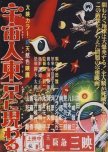Esta resenha pode conter spoilers
Japan's first color sci-fi movie made full use of the technicolor palette. One-eyed blue starfish aliens show up on Earth causing the natives to wonder if their actions are friendly or nefarious.
Warning from Space was both complex and quaint. You cannot take the science seriously---at all, but the story does bring forth a rather frightening threat which could end all life on Earth. Unlike the earlier Godzilla, who came to town stomping and shooting his atomic breath, in Warning from Space strange starfish aliens attempted to make contact but only caused panic. Determined to communicate with the Earthlings, the Parians were able to take human form to try and find a way to convince the local Tokyo scientists of a cosmic threat. A rogue planet, Planet R was headed straight for Earth and the only way to stop it was for all of Earth's nuclear weapons to be shot at it to either change its trajectory or blow it up. A simple enough idea but the World Council had to agree to it and they were unconvinced of aliens or a rogue planet. As the sky tinted red with temperatures and radiation rising, gigantic tidal waves and flooding appearing, the World Council agreed to using nuclear weapons to stop the impending doom. By now, everyone who could had gone underground as life on the surface was starting to cook. Would the nuclear weapons save Earth?
Warning from Space's sets and scenery were lush and vibrant. Great care was taken in creating this world. The aliens were simplistic, actors in blue starfish costumes, but this was 1956 and CGI didn't exist yet. They did remind me of Maggie Simpson in her starfish winter coat, or the Gorg from the cartoon movie Home (2015). Overall, the world building was quite effective. Miniatures were used for flooding and earthquake scenes, some better than others.
There were lessons about global and galactic cooperation, the use of nuclear weapons and the dangers of even more potent weapons. Though the movie is for 7+, scenes of animals dying on the surface could be disturbing.
Like I said, you can't take the science seriously, it was the 1950's with duck and cover nuclear bomb drills in real life. With that in mind, the ending and much of the middle didn't make sense. You have to put yourself in a simpler, less informed time.
The cast was rather large so most of the characters tended to come off as dry and ill-defined but the majority of the acting filled the bill. The story lagged at times, especially when the aliens inexplicably disappeared for a bit. Even with the detractions, the question of the Earth's fate as humans hid underground dealing with the fallout of the rogue planet hurtling ever closer did give it an edge.
Warning from Space had some intriguing concepts and beautiful cinematography for a 1956 film. Certainly not for everyone, but if you enjoy old sci-fi movies, Japan's first color sci-fi might be one to try out.
8/20/22
Warning from Space was both complex and quaint. You cannot take the science seriously---at all, but the story does bring forth a rather frightening threat which could end all life on Earth. Unlike the earlier Godzilla, who came to town stomping and shooting his atomic breath, in Warning from Space strange starfish aliens attempted to make contact but only caused panic. Determined to communicate with the Earthlings, the Parians were able to take human form to try and find a way to convince the local Tokyo scientists of a cosmic threat. A rogue planet, Planet R was headed straight for Earth and the only way to stop it was for all of Earth's nuclear weapons to be shot at it to either change its trajectory or blow it up. A simple enough idea but the World Council had to agree to it and they were unconvinced of aliens or a rogue planet. As the sky tinted red with temperatures and radiation rising, gigantic tidal waves and flooding appearing, the World Council agreed to using nuclear weapons to stop the impending doom. By now, everyone who could had gone underground as life on the surface was starting to cook. Would the nuclear weapons save Earth?
Warning from Space's sets and scenery were lush and vibrant. Great care was taken in creating this world. The aliens were simplistic, actors in blue starfish costumes, but this was 1956 and CGI didn't exist yet. They did remind me of Maggie Simpson in her starfish winter coat, or the Gorg from the cartoon movie Home (2015). Overall, the world building was quite effective. Miniatures were used for flooding and earthquake scenes, some better than others.
There were lessons about global and galactic cooperation, the use of nuclear weapons and the dangers of even more potent weapons. Though the movie is for 7+, scenes of animals dying on the surface could be disturbing.
Like I said, you can't take the science seriously, it was the 1950's with duck and cover nuclear bomb drills in real life. With that in mind, the ending and much of the middle didn't make sense. You have to put yourself in a simpler, less informed time.
The cast was rather large so most of the characters tended to come off as dry and ill-defined but the majority of the acting filled the bill. The story lagged at times, especially when the aliens inexplicably disappeared for a bit. Even with the detractions, the question of the Earth's fate as humans hid underground dealing with the fallout of the rogue planet hurtling ever closer did give it an edge.
Warning from Space had some intriguing concepts and beautiful cinematography for a 1956 film. Certainly not for everyone, but if you enjoy old sci-fi movies, Japan's first color sci-fi might be one to try out.
8/20/22
Esta resenha foi útil para você?

 55
55 217
217 11
11























